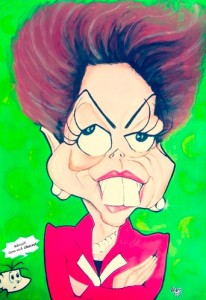Marc Sergio Lima writes: Brazil’s budget deficit unexpectedly widened to a record in September, prompting the government to say it won’t meet its fiscal target as a possible credit downgrade looms. Swap rates rose.
The deficit widened to 69.4 billion reais ($28.4 billion), more than twice the 31.1 billion reais. The gap is the biggest since December 2001, and for the first time ever, Brazil posted a primary deficit for the first nine months of the year, totaling 15.3 billion reais.
Fresh off the closest election win since the return of democracy, President Dilma Rousseff faces the challenge of pulling Brazil out of recession, slowing above target inflation and preventing a further deterioration of fiscal accounts that threatens the country’s investment grade status. This week the central bank surprised analysts with a interest rate increase, marking the first measure in an effort to regain investor confidence. Now the government has to cut spending.
“The credit rating firms have made it clear that the fiscal dynamics are very bad and a downgrade will happen if there isn’t a clear, very strong and credible signal the government will reverse spending increases,” Santos said in a phone interview from Sao Paulo. “It remains to be seen if the government will be able to do so.”
In March Standard & Poor’s downgraded Brazil’s credit rating to one level above junk, citing a slowdown in economic growth and a deterioration in fiscal accounts. Moody’s Investors Service signaled it could cut Brazil’s credit rating to one level above junk when it lowered the outlook to negative last month.
The primary surplus, which excludes interest payments, narrowed to 0.61 percent of gross domestic product in the 12 months through September, compared with a 1.9 percent target for 2014.
The cost to protect the nation’s debt securities against non-payment for five years dropped yesterday as investors interpreted the central bank move as a sign Rousseff is willing to unwind policies that fanned inflation and boosted the budget deficit.
Brazil’s economy entered recession after gross domestic product shrank 0.6 percent in the second quarter in the biggest quarterly contraction since 2009. That followed a revised 0.2 percent drop in the first three months of the year.

